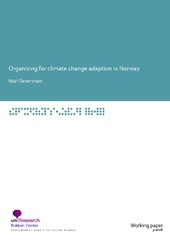| dc.contributor.author | Severinsen, Mari | |
| dc.date.accessioned | 2018-01-12T08:26:54Z | |
| dc.date.accessioned | 2020-12-10T06:31:27Z | |
| dc.date.available | 2018-01-12T08:26:54Z | |
| dc.date.available | 2020-12-10T06:31:27Z | |
| dc.date.issued | 2016-07 | |
| dc.identifier.issn | 1503-0946 | |
| dc.identifier.uri | https://hdl.handle.net/1956/17206 | |
| dc.description.abstract | How does organizational structures effect the development of a policy field, and how is the structure decided? What challenges does wicked problems cause for traditionally base governing systems with a clear hierarchical structure? This paper takes a closer look at how climate change adaption as a policy field has developed in Norway and how it has been organized. Climate change adaption can be referred to as a wicked problem, which means that it does not follow the traditional structures of organization and is characterized as being complex, ambiguous and uncertain. The transboundary nature of climate change adaption has effected the development of the policy field, especially regarding how it has been organized. A main conclusion is that how climate change adaption has been defined and which political actors that has participated through out the process has effected the development of the policy field. Furthermore, the paper discusses different aspects of the development of the policy field and their impact on how climate change adaption as a policy field has developed. | en_US |
| dc.language.iso | eng | eng |
| dc.publisher | Stein Rokkan Centre for Social Studies | eng |
| dc.relation.ispartofseries | Working paper; 7-2016 | eng |
| dc.title | Organizing for climate change adaption in Norway | eng |
| dc.type | Working paper | eng |
| dc.rights.holder | Copyright Stein Rokkan Centre for Social Studies. All rights reserved. | eng |
| dc.description.version | publishedVersion | |
| dc.subject.nsi | VDP::Samfunnsvitenskap: 200 | |
